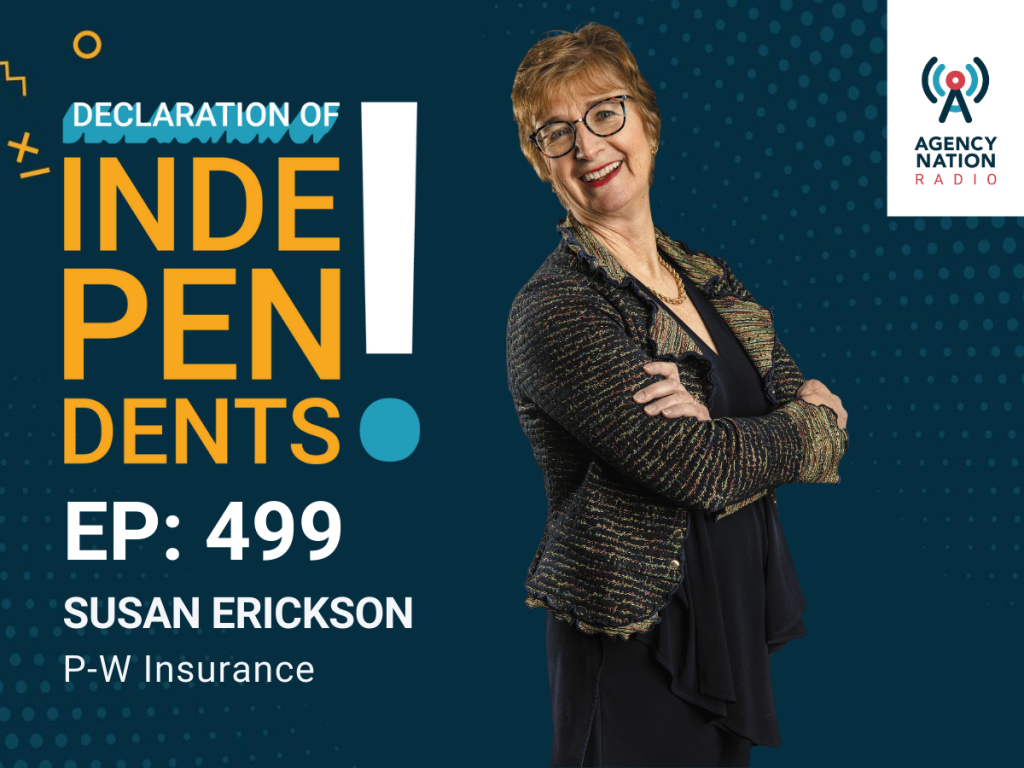Talking With Walker
By: Katie Butler
Owner of a second-generation family agency. Generalist with a 50/50 mix of personal and commercial lines business. Currently facing an agency perpetuation planning challenge.
Many things about new Big “I” Chairman David Walker, president of Hartland Insurance Agency in Hartland, Michigan, are similar to independent agents across the country.
But then there is this: Walker was familiar with crops before he had ever heard of crop insurance. IA talked to him about his background and his plans for his year as chairman of the association.
IA: Where are you from?
Walker: I’m originally from Nebraska. I grew up in Lincoln and spent summers at my grandparents’ family farm.
How do you think that upbringing affects your work life?
When you grow up in those kinds of environments, you have to be pretty direct and you have to be pretty practical. You don’t have any choice. You can’t be theoretical on a farm. You have to figure out a solution and that’s the way it is, even if things aren’t as you planned.
How did you get into the insurance business?
Because of my father-in-law. He started a very small agency from scratch. He called not long after Barbara and I had gotten married and said, “I need help. I’m growing this and there is too much for me.” Family was very important to us. The deal we cut was that we would try it for two years, but if it impacted our family relationship in any way, shape or form, we were going to leave. Now, 30 plus years later, we’re still there. My father-in-law passed away in 1992.
For the second year in a row, we have a chairman who works alongside their spouse in the agency. What are your tips for making a family business work?
Barbara and I have a good working relationship. She does her thing and I do my thing. You just have to be patient and collaborative. Being married is hard enough—being married and in business together is even harder. What you have to do is walk away and not talk about the office. We’re not very good at that. But we do figure out ways and times to do it—we both have the distraction of hobbies.
Can you tell readers a little bit about your agency?
We are a second-generation family-owned agency. And we’re really looking at what the next step in ownership will be, only because I don’t think either one of our children has any desire to go into the insurance business. We’re looking at financing it internally because we want to perpetuate it and give the young producers in our office the opportunity to own it.
What do you think is the biggest challenge of running an independent agency today?
For agency principals, it’s the constant battle of dealing with market cycles—hard market to soft market, how long they last. Trying to be predictive and trying to do budget planning is really a challenge. You have to be much more nimble today because the market cycles change so quickly.
What are the most important issues facing the insurance industry right now?
With personal lines, right now it’s about market share—how do we recapture what we’ve lost? The Consumer Agent Portal (CAP) is certainly one of those tools, along with the Trusted Choice brand. Commercial lines has a different challenge. On small- to medium-sized commercial lines, we’re operating agencies right now as if it were the ’70s. The whole nexus for forming ACORD back in the ’70s was that if you wanted to get eight quotes from eight companies, you would actually fill out eight applications and 95% of the answers on those eight applications would be identical. It was terribly inefficient. That’s why we created the ACORD form. You filled out that one ACORD form, and back in the day when carriers came in, one of the first questions you asked was “Do you accept ACORD forms?” It was an ease-of-doing-business issue.
Fast forward to today—if you represent those same eight carriers, ask me how many websites my producers have to visit to get a quote. Do they have to input 95% of the same information into those websites to get a quote? My point is we’re back to the same problem we had in the ’70s and ’80s— we’ve just applied technology to it. And it’s an ease-of-doing-business issue—again.
How about over the next five to 10 years?
The constant challenge is perpetuation, mergers and acquisitions and recruiting quality producers. Are there other issues? Sure. Mergers and acquisitions at the carrier level affect us. You’ve also got more and more of the work pushed downstream without any real compensation attached to it.
How did you get involved in the association at the state and national level?
My father-in-law was never active in the association. We were a start-up agency at that point only representing a couple of companies, but he said I should go to the meeting. So I went and immediately got engaged and never stopped. In the late 1980s, I served on the national young agents committee. In the early ’90s, I was on the state board and made the decision to go through the chairs at the state level. And once I was done with that, I decided to run for director from Michigan and thought I still had something to offer. I served as Michigan’s director for five years before I ran for the executive committee.
What do you like about being a producer that has kept you in the business? What advice would you give to a young producer entering the industry?
What I like about being an independent agent is the diversity. Even within a market segment, you can choose so many different challenges or exposures. I also like the problem-solving aspect—when someone comes to you and says “This is what I’ve got, this is what I want to do, how do you protect this?”
Constantly look for innovation in the industry. When I started in this business, innovation was carbon paper. The evolution of this industry isn’t over—we’re still figuring out new and different ways to do business. And it’s been amazing for me to watch, especially with CAP and some of the other folks out there, what they’ve been able to do with the technology aspect of running an agency has changed so dramatically. And I don’t think we’re done with that transition. I would tell them to embrace it and constantly push forward on the technology aspect to help you to do business. Look at it from the perspective of how this will make us a better, more nimble organization and how will we respond to customer needs.
Can you discuss the unique value the Big ‘I’ brings in a time when agents can connect with each other without the association?
The unique value is in the ability to coalesce different services together into one single source. Do I need industry information about agency and company contracts? Do I need E&O coverage? I have a question on a piece of legislation that may be occurring in my state or at the federal level. What do you know about X insurance company, because they are coming into my state and want to appoint me? You have a source to find a solution to a vast majority of those problems by being a member of the association.
What are your goals for your term as Big ‘I’ chairman?
We have just gone through this process of putting a long-range plan together. I think 60% of my time will be focused on the beginning of the implementation of the long-range plan. That will put in place the things we need to do to move the association forward, make it better for our members and make it fit with our mission statement of providing agents with a competitive, sustainable advantage.
What are you looking forward to the most during your year as chairman?
The same thing I have enjoyed for the last seven years: the interaction I have with agents, company partners and association staff nationwide. They are great people. It’s fun, it’s interesting and everyone is different.
Katie Butler is IA editor in chief.










